More often than not, authors make the imagined compatible with the real. The world around us continues to exist while we read, even if we believe everything the author tells us. In A History of What Comes Next, the Kibsu insert themselves into history in their bid to take us to the stars, but the resulting timeline is the one we know. There are few, if any, verifiable facts that would contradict the storyline and, conversely, nothing in our present would change if it all happened to be true. There are those, however, who aren’t so kind to our reality, authors whose stories mess with past events and take a wrecking ball to our timeline.
The most inspiring and tragic events in history make good candidates for alternate or secret histories and both are often intertwined. The space race and the Second World War, for example, are inexorably linked, and alternate or secret histories of one will often involve the other. It is, of course, almost impossible to talk about alternate histories of World War II without mentioning The Man in the High Castle by Philip K. Dick. Since it will be on just about every list of this sort, I chose not to include it.
Without further ado, here are some of my favorite reimaginings of the War and the Space Race that followed.
The Calculating Stars by Mary Robinette Kowal
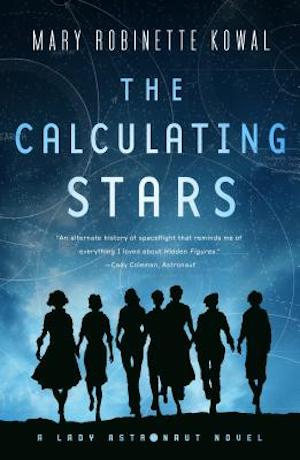
So much for avoiding the obvious. The Calculating Stars is an instant classic and absolutely everyone should read it. A meteorite hits Earth in 1952 and the resulting global warming menaces all life on the planet. While an international coalition speeds up the space program in the hopes of saving humanity, an incredibly smart human computer persists in her attempts at joining a mission to the moon despite rampant sexism. Mary Robinette Kowal captures the spirit of the era with finesse and the main character is an absolute gem. It’s no surprise the book won the Hugo, the Nebula and the Locus Awards. If you know anything about the history of women pilots, the Ninety-Nines, or the First Lady Astronaut Trainees (aka Mercury Thirteen), you’ll absolutely love this, and if not, this is a wonderful introduction to the subject. Bonus: It’s the first of the Lady Astronaut series. Two more novels: The Fated Sky and The Relentless Moon are available now. There are also two novelettes in the same universe.
The Oppenheimer Alternative by Robert J. Sawyer
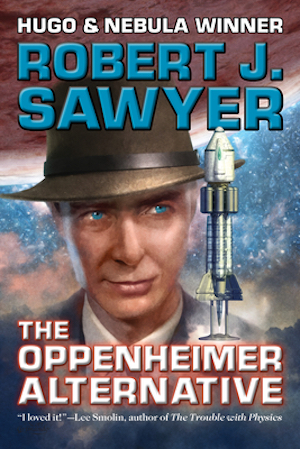
All life on Earth is a few decades away from being scorched into oblivion (of course it is) and the world’s greatest minds band together to stop it. You know many of them. There’s the titular J. Robert Oppenheimer, obviously, but also Albert Enstein, Leo Szilard, Niels Bohr, Edward Teller, Wernher von Braun, Richard Feynman, Arthur Compton, Enrico Fermi, etc., etc. Every single character in this book is a real person. That’s right, all of them. Even some of the dialogue is real. This is one of the most ambitious books I’ve come across. I can’t imagine the amount of research that went into giving each character a believable voice and personality (actually, I can, the bibliography runs 30 pages on my phone), but this is Robert J. Sawyer so maybe I shouldn’t be surprised. In some ways, it reminded me of the play Copenhagen by Michael Frayn, with more thrills, cool rockets and a doomsday scenario to boot.
Farthing by Jo Walton
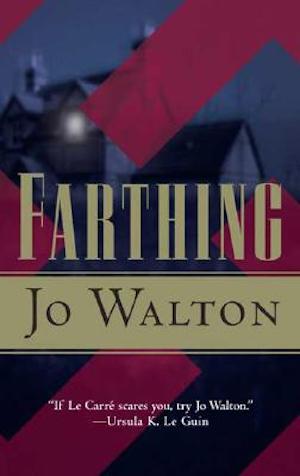
This is, on appearance, a typical murder mystery set in 1949’s England, but this is not our England. This one sold its soul to put an end to the hostilities with Hitler. It’s an England rotting at its core where antisemitism runs free. When a politician turns up dead at the famous Farthing estate, the prime suspect is naturally the Jewish husband of the main protagonist, which may be the reason he was invited in the first place. It’s up to inspector Carmichael from Scotland Yard to solve the mystery. The book is a brilliant take on fascism and a great whodunnit. It’s quite dark, as you might have guessed, but the alt-history part is introduced rather subtly. Farthing, the house, feels like a creepy Downton Abbey/Knives Out mansion and the characters are wonderful. Though the story takes place more than seventy years ago, the subject matter, and the plot, are disturbingly apropos. Farthing was nominated for the Nebula and the Campbell Memorial Award. Bonus: This is the first of a trilogy. The other two novels, Ha’penny and Half a Crown, are both out.
United States of Japan by Peter Tieryas
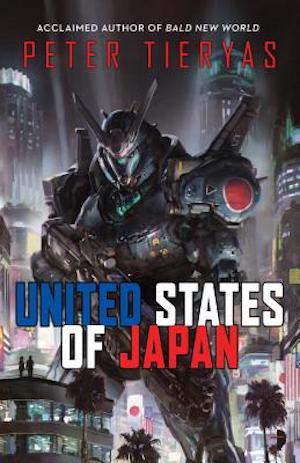
OK, so I didn’t put The Man in the High Castle on the list but this one is heavily inspired by it. You can guess from the title who won the War. The story follows a video game censor and an Imperial Government agent who investigates a subversive game showing a world where the Allies were victorious. It’s an engaging reflection on oppression, patriotism and nationalism, a thrilling detective story with some kick-ass action and a slick cyberpunk atmosphere. There’s a bit of an anime feel to it, halfway between the real and imaginary. And yes, there are some giant mechs in there. It’s not a retelling of the war itself, but come on, alternate history WITH giant robots. What more do you want from life? Bonus: There are two more stand-alone novels in the same universe: Mecha Samurai Empire (TONS of giant robots) and Cyber Shogun Revolution. On a side note, the food in those books sounds absolutely amazing. I’m hungry just thinking about it.
Ascent by Jed Mercurio / Ascent by Jed Mercurio and Wesley Robins
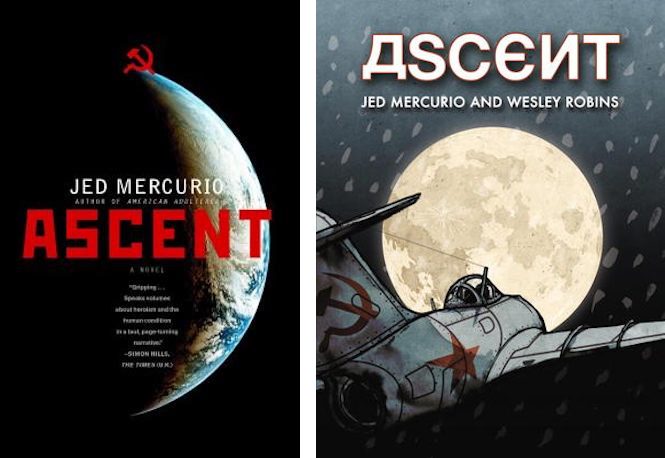
What if the Soviets put the first man on the Moon and we just never heard about it? This is the story of Yefgenii Yeremin, a Stalingrad orphan who becomes an ace pilot in the Korean war before being court-martialed and sent into exile. He’ll come back for a daring, if ill-conceived mission to get to the Moon before the Americans plant their flag. Ascent is both a novel and a graphic novel, the latter based on the former. I went for the graphic novel. The aerial scenes are particularly vivid. The art by Robins is gorgeous and haunting, the mood expertly set with sharp lines and an exquisitely bleak palette. And bleak it is, Yefgenii’s life is tragic, from his time at the orphanage to his final mission. I’m not always a fan of graphic novels but I absolutely adored this book.
Buy the Book
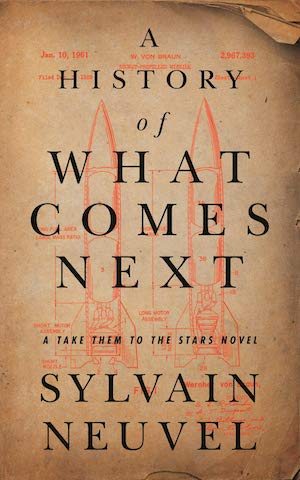

A History of What Comes Next
Sylvain Neuvel dropped out of high school at age 15. Along the way, he has been a journalist, worked in soil decontamination, sold ice cream in California, and taught linguistics in India. He’s also a certified translator, though he wishes he were an astronaut. He writes about aliens and giant robots as a blatant excuse to build action figures (for his son, of course).










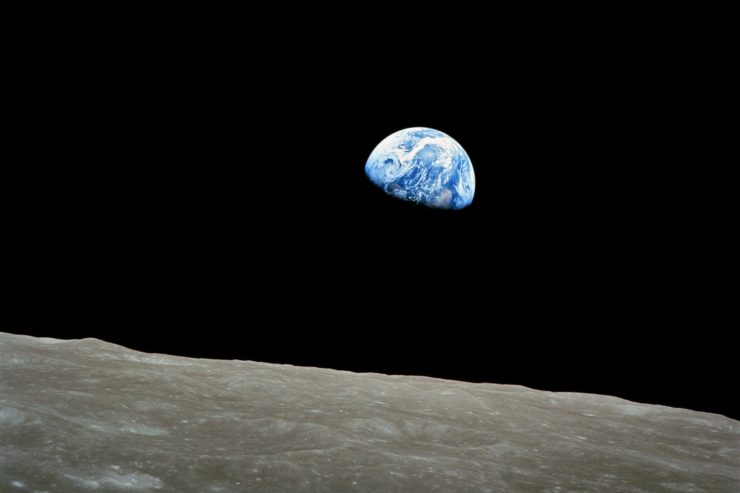
Good choices. I love Farthing and the rest of the cycle, which are awesome (and creepy).
Farthing sounds like a take on SS GB by Len Deighton
Fatherland by Robert Harris.
When I read “space race” I immediately thought of Stephen Baxter’s so-called NASA trilogy (Voyage, Titan, and Moonseed).
But then I realized it’s “space race” not “space program”, so the Baxter novels don’t qualify after all. Still worth a lot for those who are interested in an alternative take on NASA’s space program.
See also the graphic novel/miniseries “Ministry of Space” by Warren Ellis. In it, the British army gets to Peenemunde before the US and the Soviets, and scoops up all the German rocket scientists. Consequently, Britain remains much more of a Great Power after WWII, since it now has the edge in missile technology and space exploration, which also affects the entire Cold War dynamics as we knew it.
Sawyer’s and Walton’s novels are my favorite here. I found Kowal’s a bit unrealistic.
A few great missing entries:
– Voyager, by Stephen Baxter – I think it is greatly underappreciated and For All Mankind basically tells similar story, about first female astronaut on Mars (among other stories).
– Ministry of Space – a comic by Warren Ellis and Chris Weston; very thoughtful investigation what/if the the space exploration is worth
– Red Moon – a novel, but not Robisnon, the author was n amaerican journalist specializing in space news; the bok came out in 1990s, small press; amazing attention to the details, some obscured accidents from the our-time-line Soviet space program were mentioned(!)
– First on the Moon – a 2005 Russian mocumentary movie about a secret flight to the moon in the 1930s; it is really a story of the Stalint’t purges; filmed on a typical 1930s cameras for autenticity
I can go on for a long time, I just listed some of my personal favorites.
There’s the Turtledove Worldwar books of course, which ultimately result in a space program to make a point to the invaders.
Also SM Stirling’s Drakka books.
Ian Sales’ Apollo Quartet of novellas also fit the Cold War – Space race description.
I would also include Harry Turtledove’s A WORLD OF DIFFERENCE (1990, written before the breakup of the USSR), where the breakpoint is billions of years ago, so this universe’s Mars is bigger than ours and supports life. The Americans and Russians both send missions to the planet, with radically different agendas.
I would also include Harry Turtledove’s A WORLD OF DIFFERENCE (1990, written before the breakup of the USSR), where the breakpoint is billions of years ago, so this universe’s Mars is bigger than ours and supports life. The Americans and Russians both send missions to the planet, with radically different agendas.
Re #6, Vladimir Ivanov’s comment — I hope he meant my RED MOON (Forge 2001). There was another book by the same title, published the same year, which might have been more of an alt history….
Sorry, Valentin Ivanov.
@2: Deighton writes thrillers; Walton writes people stories. IMO the Small Change trilogy is superior to anything Deighton has written.
This seems to be a mix of alternate-WW2 and alternate-space stories, with a couple where the alternate WW2 actually leads to an alternate space program (as Small Change does not — although one wonders whether there would be a space program in that world, given the shortage of escaped German scientists in the US and the exhaustion/defeat of the Soviet Union). One older alternate-WW2 story that is worth noting is The Sound of His Horn by “Sarban”; it’s set a century after a Nazi victory, in a world where rich Germans hunt modified humans. If you accept short work as well, “The Fall of Frenchy Steiner” is a snapshot of temporarily-victorious Nazis being broken by their superstitions.
Allen Steele’s “Blue Horizon/Goddard’s People/etc-verse” was a fun read, that was – given the points of departure – reasonably grounded in terms of history and technology.
https://www.tor.com/2014/02/24/book-review-v-s-day-allen-steele/
@11/12 – yes, this was it! Thanks for the nice book!
I remember the gyro trigger that got tipped by the Earth’s rotation during a delayed launch attempt. This really took place. I wonder how much reading was needed to come up with such a level if details.
RE: the Oppenheimer alt-hist by Rob Sawyer. Thanks! Now @@@@@ base of Mt. TBR!
Your mini-review reminds me of Benford’s recent The Berlin Project
https://www.goodreads.com/review/show/2043450969
What if The Manhattan Proj had gone with centrifuge enrichment? (which everyone uses today)….
Benford was personally acquainted with many of his characters, who were almost all real people. He married a daughter of his protagonist, Karl Cohen, a chemist and self-taught physicist who worked on the centrifuge-enrichment project. Which, Cohen thought, might have succeeded with another $100,000 in funding — but they couldn’t get it. What if?
Highly recommended, especially for war-history and nuclear-weapons buffs.
For #15, Valentin Ivanov — that incident was true, as were all the macro incidents in RED MOON (which was, BTW, not a small press book, but from Tor Forge). Which makes RM an iffy choice for alt history ala Mary Robinette Kowal’s fantastic series. But I’m happy to have the book remembered.
Kowal’s series is solid enough, but Steele beat Kowal by 25 years, and didn’t depend upon a world-shattering kaboom to set his plot in motion.
John Harper Wilson
Goddard’s People
Tor published Arkwright in 2016; seems odd Steele was just skipped over on this topic…
Good heavens! How could you miss the epic Harry Turtledove alternate history where aliens invade in the middle of WWII and disrupts everything – and progresses into the future, with space travel?
I was a little disappointed to find The Milkweed Trilogy left out of this list, but I imagine it’s always hard to cull out names with such a small number of finalists. If you aren’t familiar, it’s a brilliant trilogy by Ian Tregillis that tells the story of how WWII might have gone had England employed warlocks and Germany trained 5 superpowered soldiers (as in, invisible, firestarters, clairvoyant).
Sidenote – I absolutely loved your Themis Files, and have recommended them to a few of my friends.
@16
You need to read “The Making of the Atomic Bomb” by Rhodes.
Nothing by Harry Turtledove? I find that a bit odd.
I’m intrigued by your comment @Yehuda, so I went looking for the books you mention. Apparently, in the states they’re known as “Milkweed Triptych Series”. Looks right up my alley, many thanks.
Declare, by Tim Powers. Got nominated for the Nebula and a bunch of other awards.
A secret history of WW2 and the Cold War involving djinn, British and Soviet spies, and, you know, demons.
@22
A World of Difference
https://en.wikipedia.org/wiki/A_World_of_Difference_(novel)
The USSR and US fight to see who can colonize or Sovietize Martians on an Alternate, Earth sized, Mars called Minerva. It ends predictably for a Turtledove novel.
Don’t forget The Shift, where our timeline clashes with an alternate reality where the Axis has won the Second World War and developed advanced space capabilities.
https://www.amazon.com/dp/B08975DPN7